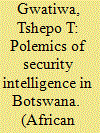| Srl | Item |
| 1 |
ID:
137192


|
|
|
|
|
| Summary/Abstract |
This article discusses the validity of national security threats in Botswana and whether they justified the creation of the Directorate of Intelligence and Security Services (DISS), which has been controversial since its formation. Since its inception in 2008, the DISS has been accused of many human rights violations and politicisation. Without fully deliberating on the basis for its creation, some discourses have focused on the politicised operations without relation to what the DISS is supposed to be doing. The author works under the assumption that debates should be shaped by whether it was necessary to create the DISS, and, if so, how we can shape and steer debates on its oversight, management, reform and operations. This article argues that despite the politicisation of the DISS, Botswana's national security threats are both real and imagined; and that domestic threats to national security have moved from the conceptual ‘imagined’ category to the ‘real’. However, that in itself did not warrant the design and mandate of the DISS, and the article argues that it was external threats that really warranted the creation of a civilian intelligence agency. The article concludes that Botswana faces a plethora of external security threats – traditional and non-traditional – that warranted the creation and continuance of the DISS.
|
|
|
|
|
|
|
|
|
|
|
|
|
|
|
|
| 2 |
ID:
178116


|
|
|
|
|
| Summary/Abstract |
This article examines the impact that three political leaders—Seretse Khama, Kenneth Kaunda and Julius Nyerere—had on navigating the long-term risk associated with mass atrocities. While the scholarship on comparative genocide studies has acknowledged the crucial dimension of leadership in the perpetration of such violence, very little is known about the preventive influence of leaders in cases where risk is present. This influence works both ways: the ideas, decisions and policies of political leaders are often the most instrumental factor in effective processes of risk mitigation. Yet to date, there has been no systematic study of the role of leadership in managing and ameliorating risk associated with mass atrocities. Indeed, the more general question of why mass atrocities do not occur is also largely neglected. I argue that these leaders were cognisant of the disruptive potential of tribal, ethnic and religious division; they advocated for inclusive national identities and developed policies that fostered social cohesion; and were effective in creating social and political environments that had an inhibitory effect on structural risk factors associated with atrocity crimes.
|
|
|
|
|
|
|
|
|
|
|
|
|
|
|
|